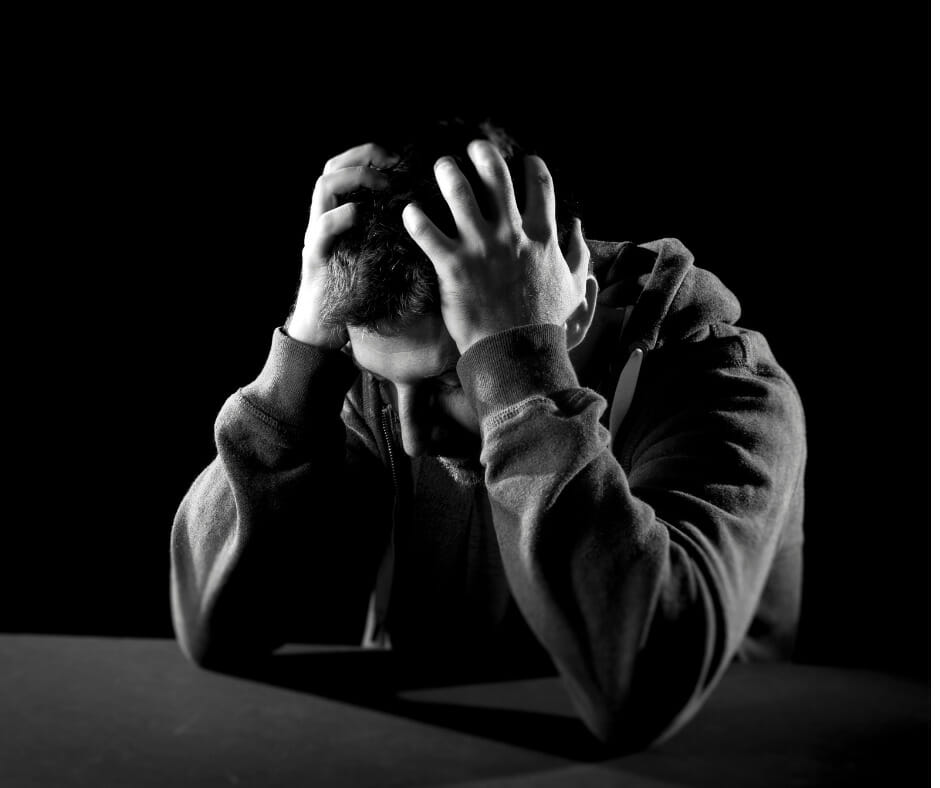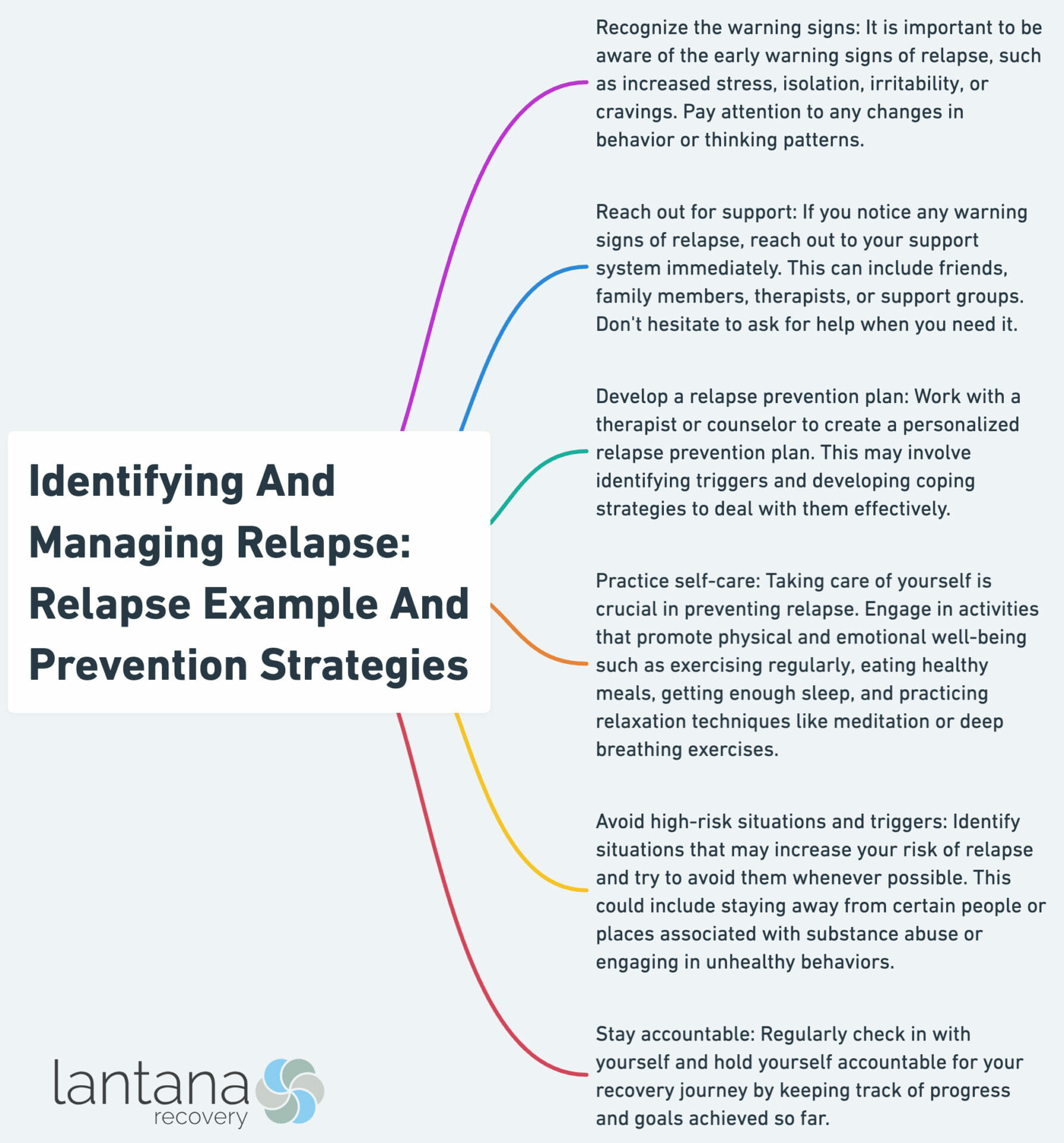Have you ever wondered how to navigate the complex journey of addiction recovery and prevent relapse? You’re not alone. In this blog post, we’ll share valuable insights on identifying and managing relapse, provide real-life relapse examples, and discuss prevention strategies. We’ll also dive into the stages of relapse, common triggers, and treatment options, as well as offer guidance on supporting a loved one experiencing relapse. Let’s embark on this informative journey together and discover new perspectives on this challenging but rewarding process.
Key Takeaways
- Identifying and managing relapse requires understanding its causes, examples, stages, triggers and prevention strategies.
- Building a support system with family members & professionals can help reduce the risk of relapse.
- Treatment options such as detox programs & CBT are available to manage relapses. Loved ones should provide empathy & encouragement during this time.
Understanding Relapse: Causes and Examples

Addiction relapse is the recurrence of substance abuse or addictive behavior following a period of abstinence or recovery. It does not imply that treatment was unsuccessful or that abstinence will never be attainable. Relapses can be triggered by a variety of internal and external factors, including:
- Cravings
- Isolation
- Stress
- Negative thought patterns and mental health deterioration
These factors can lead to a future relapse. A deeper understanding of relapse can be achieved by examining some examples and what triggers them.
Substance Abuse Relapse Examples
Let’s talk about John, who had been abstinent for two years but faced a stressful event that led him to resume substance use, including alcohol abuse. His story highlights the importance of ongoing addiction treatment and support.
Another example is cross-addiction, where an individual substitutes one addiction with another. Common physiological withdrawal symptoms, such as nausea, sweating, or insomnia, can also contribute to drug relapse. In addition, post-acute withdrawal symptoms may play a role in this process.
Taking drugs like heroin or opioids after a period of sobriety carries significant risks, as the individual may not know their body’s tolerance. Preventing relapse requires the identification and management of potential triggers linked to substance use.
Mental Health Relapse Examples
Mental health can play a significant role in relapse. For instance, individuals not adhering to treatments for depression or anxiety, which are common mental health issues, may be tempted to self-medicate with drugs and alcohol. Differentiating between sporadic thoughts of usage and mental relapse is key; the former is a common occurrence in the initial stages of recovery.
Recovery is a fragile process that needs to be protected. High-risk environments, such as airports or all-inclusive resorts, can instigate an individual to relapse if encountered during early recovery stages. Therapy can be incredibly valuable when trying to prevent hazardous circumstances. It provides the necessary support for clients to make positive choices.
The Stages of Relapse

What is a relapse in recovery? Relapse can be divided into three stages: emotional, mental, and physical. Each stage carries its own unique set of challenges. Emotional relapse indicators may include suppressing emotions, withdrawing from social activities, and exhibiting unhealthy dietary and sleeping patterns.
Mental relapse signs include contemplating drug or alcohol use, and changes in behavior, mood, and thought patterns. Physical relapse indications encompass drug or alcohol use, physical cravings, and struggling with addiction acknowledgment.
The progression between emotional and mental relapse is often the result of sustained, inadequate self-care. Relapse prevention strategies include:
- Building a support system
- Practicing self-care
- Cultivating healthy coping skills
- Engaging in cognitive therapy
Common Relapse Triggers

Relapse triggers can include environmental factors, such as places, people, or situations associated with past substance use. Emotional factors, like moods, attitudes, and behaviors, can also contribute to relapse.
Environmental Triggers
Environmental relapse triggers refer to specific environments or situations heightening relapse risk for those recovering from addiction. This includes locations where substances were previously used or being around people who still use them.
To identify environmental triggers, individuals in recovery can reflect on past experiences and note which environments were associated with substance use. Avoiding situations or locations linked to past use and developing healthy coping mechanisms for high-stress situations help mitigate these triggers.
Emotional Triggers
Emotional triggers, such as stress, negative emotions, or unresolved trauma, can lead to relapse. Identification of these emotions and their management using healthy coping strategies, a support network, and self-care is fundamental. Effective management of emotional triggers enables individuals to minimize relapse risk and uphold a healthier path to recovery.
Physical Triggers
Physical triggers for relapse include:
- Withdrawal symptoms: physical manifestations arising when an individual stops using a substance they are dependent on, like nausea, headaches, or fatigue
- Cravings: intense desires or urges to use a substance
- Cross addictions: developing an addiction to a different substance or behavior after overcoming one addiction
Cravings are intense desires to use a substance, often triggered by environmental cues, such as seeing a bottle of alcohol or being in a place where a drug addict might use drugs. Cross-addictions involve substituting one addiction with another, such as switching from alcohol to cigarettes or gambling.
Relapse Prevention Strategies

Constructing a robust support system, engaging in self-care activities, and cultivating healthy coping skills are strategies that can be employed to reduce the risk of relapse. Addictive thinking can hinder individuals from recognizing the need to prioritize their well-being.
Poor self-care often correlates with drug or alcohol use, especially when substances are used as a form of reward or to enhance positive feelings. However, adopting self-care practices can lead to the discovery of healthier ways to manage stress, relax, or reward oneself.
Building a Support System
A robust support network plays a vital role in sustaining recovery by providing the required resources and backing to keep individuals on course. A recovery circle is a group of individuals comprising:
- Family members
- Medical professionals
- Counselors at an institution like Lantana Recovery
- Self-help groups
- Sponsors
Self-honesty is essential in addiction recovery, as it facilitates individuals to be candid when discussing within their recovery circle. Consistently participating in self-help group meetings, having a sponsor, and studying 12-step materials are the best ways to maximize the benefits of 12-step groups. Studies like the 2022 research by Wnuk have found that participation in Alcoholics Anonymous (AA) is a key psychosocial factor in the recovery of individuals dependent on alcohol.
Maintaining Self-Care
A healthy lifestyle, which reduces the likelihood of relapse, requires:
- Regular exercise, which can help decrease stress and elevate mood
- Balanced nutrition, which supplies the body with necessary nutrients to remain healthy
- Adequate sleep can help reduce stress and enhance overall health.
Some strategies for maintaining a healthy lifestyle include consuming a balanced diet, engaging in regular physical activity, ensuring adequate sleep, and managing stress.
Developing Healthy Coping Skills
Healthy coping skills encompass strategies that aid in the efficient management of stress, emotions, and triggers. Signs of stress can be manifested through physical indicators such as headaches, muscle tension, and difficulty sleeping. To address stress effectively, relaxation techniques like deep breathing, mindfulness, and yoga can be utilized.
Recognizing emotions and managing them with self-care activities, such as journaling, conversing with a friend, and participating in a leisure activity, can be beneficial. Identifying triggers and managing them with avoidance or distraction techniques can also help reduce the risk of relapse. For example, “the main tools of relapse prevention are cognitive therapy and mind-body relaxation, which are used to develop healthy coping skills” (Relapse Prevention and the Five Rules of Recovery, Melemis, 2015.)
Treatment Options for Relapse

For those who have experienced a relapse, various treatment options are available, including detox, inpatient and outpatient programs, and behavioral therapies like cognitive behavioral therapy (CBT). If you have completed a treatment program at a relapse prevention class and experienced a relapse, it is advisable to contact your former (or current) treatment providers for guidance on the next step.
Treatment options like inpatient and outpatient treatment programs, therapy, and support groups are available at Lantana Recovery. The goal of relapse prevention therapy is to assist individuals in recognizing the signs of relapse during the early stages to maximize the potential for a successful recovery.
How to Support a Loved One Experiencing Relapse

When a loved one is experiencing a relapse, showing empathy, encouragement, and understanding is of utmost importance. This can assist the person in feeling supported and less isolated in their difficulty.
Engaging in family therapy and addiction education can facilitate an understanding of the indicators of relapse and promote healthier means of mutual support and communication. It is essential to abstain from blaming or shaming a loved one who has relapsed, as this can be counterproductive to their recovery process.

Summary
In conclusion, understanding and managing relapse is a crucial component of the addiction recovery journey. By identifying triggers, practicing self-care, building a support system, and developing healthy coping skills, individuals can reduce the risk of relapse and maintain long-term sobriety. Remember, recovery is an ongoing process, and setbacks are a normal part of the journey. With the right support, treatment, and understanding, we can all emerge stronger and more resilient.
Frequently Asked Questions
What are examples of relapse attitudes?
Common relapse attitudes include rationalizing drug or alcohol use, minimizing the importance of triggers, avoiding social support, and denying one’s powerlessness. Such attitudes can lead to a relapse in drug or alcohol use.
What are the two types of relapse?
Relapse is divided into two stages: emotional and physical. Emotional relapse results from a lack of self-care, leading to feelings of discomfort and a desire to escape or reward oneself. Physical relapse involves actually engaging in addictive behavior.
What does a relapse feel like?
Relapse can be an emotionally draining experience, as it is characterized by moodiness, anger, and a longing for one’s previous lifestyle of using drugs or alcohol. It can often feel like giving up on recovery altogether.
How can I support a loved one experiencing a relapse?
Show empathy and understanding, attend family therapy and addiction education sessions together, and be careful not to blame or shame them. These are all important steps to take when supporting a loved one with an addiction.
What are some relapse prevention strategies?
Relapse prevention strategies include building a support system, practicing self-care, and developing healthy coping skills.









